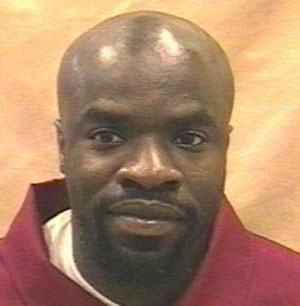U.S. Judge Finds Intentional and Systemic Racial Discrimination in Capital Cases | A Mother Would Have Lost Both Sons
Judge finds racial discrimination in death penalty
Commutes death sentence to life without parole
ACLU PRESS RELEASE, April 20, 2012
Ruling Under North Carolina’s Racial Justice Act Says No One Should Be Sent to Death Because of Racial Bias.
Fayetteville NC, U.S.A. — A North Carolina judge Friday issued a landmark decision finding intentional and systemic discrimination by state prosecutors against African-American potential jurors in capital cases and commuted the sentence of a death-row prisoner to life in prison without the possibility of parole.
The decision on behalf of Marcus Robinson by North Carolina Superior Court Judge Gregory Weeks, the first to be issued under the state’s historic Racial Justice Act, comes nearly 25 years to the day after the U.S. Supreme Court ruled in McCleskey v. Kemp that evidence of systemic bias is not sufficient to challenge a death sentence.
Passed in 2009, the Racial Justice Act allows North Carolina’s 157 death row prisoners a hearing in which they can present statistics and other evidence that death sentences state- and county-wide were tainted by race discrimination and that their death should be commuted to life in prison.
“Today’s ruling gives a sense of promise that there will be change,”
said Cassandra Stubbs, staff attorney for the ACLU Capital Punishment Project and part of the legal team that represented Robinson during his almost three-week-long Racial Justice Act hearing earlier this year.
“There is now an opportunity for prosecutors to change their practices so that the process of jury selection in North Carolina will reflect the fundamental American values of justice and fairness that we should all expect.”
 In his ruling, Weeks found that prosecutors deliberately excluded qualified black jurors from jury service in death row inmate Marcus Robinson’s case, in Cumberland County and throughout the state.
In his ruling, Weeks found that prosecutors deliberately excluded qualified black jurors from jury service in death row inmate Marcus Robinson’s case, in Cumberland County and throughout the state.
As directed by the law, Weeks ruled that parole eligibility was not an option under the Racial Justice Act and resentenced Robinson to life in prison without the possibility of parole.
The heart of the statistical evidence presented in the case came from a large study by researchers from Michigan State University that showed that state prosecutors were significantly more likely to strike African-American potential jurors. In a related study, the researchers found that defendants are much more likely to be sentenced to death if the victim is white than if the victim is black.
Today’s ruling and the findings of the Michigan State study are consistent with the findings of every major study of jury selection in capital cases done in the United States.
Robinson, who is Black, was convicted and sentenced to death for killing a white person. During his jury selection process, prosecutors struck from his jury 50 percent of the qualified potential Black jurors while striking just 15 percent of qualified white potential jurors. As a result, Robinson’s 12 person jury included just two African-Americans in a county where they make up nearly 40 percent of the population.
North Carolina, one of 34 states to maintain the death penalty, has the nation’s sixth-largest death row. Well over half of the prisoners on the state’s death row are Black.
“North Carolina’s Racial Justice Act has proven to be a powerful tool for shedding light on discrimination in the death penalty,” said Stubbs.
“For over 100 years, jury selection in capital cases has been plagued by racial discrimination against qualified African-American citizens. Today’s decision offers promise that change in this area, long overdue, is finally coming.”
A mother who has lost two sons
By Jessica Jones
North Carolina Public Radio WUNC
Eric Hodge: Later today [Jan 30, 2012], a Superior Court judge in Fayetteville will preside over a hearing that will ultimately decide whether to let a death row inmate live. Marcus Robinson is the first prisoner on death row to appeal his sentence under the Racial Justice Act, passed in 2009. If the judge finds racial bias played a role in Robinson’s conviction or sentencing, his sentence could be commuted to life in prison. Robinson’s mother, Shirley Burns, plans to attend the hearing. As the mother of one son on death row and another who was murdered, Burns is a familiar figure in Cumberland County courtrooms. Jessica Jones has her story.
 Jessica Jones: Shirley Burns lives in a quiet neighborhood outside Fayetteville, where she has worked as a nurse for years. She loves knickknacks, especially angel figurines. There’s a long line of them displayed on the mantel of her living room fireplace.
Jessica Jones: Shirley Burns lives in a quiet neighborhood outside Fayetteville, where she has worked as a nurse for years. She loves knickknacks, especially angel figurines. There’s a long line of them displayed on the mantel of her living room fireplace.
Shirley Burns: This one right here — the two large ones, are the guardian angels over the whole house.
Each figure represents something or someone to Burns. She touches her favorite- a tall angel holding one cherub in her arms with another floating above its shoulder.
Burns: Curtis is the one with the angels that has flown away. Marcus is the one that the angel is still holding in her arms. That’s the one incarcerated.
Marcus Robinson, who’s African-American, was convicted in 1994 of killing a white teenager and sent to death row. More than a decade later, his older brother Curtis, who was in the Navy, was found lying dead in a ditch. Burns says she would have lost her mind both times were it not for her strong Christian faith.
Burns: The biggest test that I’ve had to go through at first was my son being incarcerated. No parent want that and I had to draw from the well then. And I had a son who was murdered. I had to draw from the well then.
But some would say Burns has drawn from the well many times before that. Born in Georgia, she married a soldier and moved her growing family to Fayetteville. But her husband was abusive, especially toward Marcus, who was her youngest child. Burns says she took the abuse herself to prevent her husband from harming the little boy. It got so bad that one day he threatened to kill her.
Burns: The last thing I remember when that shotgun was put to my head. I said well God he say his father say I’m sick of you and that Jesus. So I say God if it’s my time to go, watch over my babies, watch over my children, and it went off and it went in the ceiling.
That emboldened Burns to stop hiding the abuse. She started going to church with black eyes so everyone in the congregation knew what was happening. Eventually, Burns divorced and went back to work as a nurse. But money was tight, and she wasn’t home during the day to keep a close eye on her kids- especially Marcus, who was a handful.
Burns: They got picked on a lot. Marcus- our children learn once you get to a certain age your parents can’t make you go to school. And I would be at work and would think he was at school. He would be at some other kid’s house.
Burns found it hard to discipline Marcus. Once he broke her window and she decided to call the police on him to teach him a lesson. But she says he kept hanging around the wrong crowd. In 1994, Marcus was convicted for the 1991 murder of Erik Tornblom. His co-defendant is serving a life sentence. Burns believes racial bias played a role in the jury’s decision to convict her son.
Burns: If you don’t have the financial resources you don’t know the right people to stand up and intervene for you, you can get the short end of the stick. And my son’s trial to me was a mockery to justice. It really was. And the racial justice act is a good thing. For everybody.
Some critics of the Racial Justice Act say it only benefits African-Americans. But Burns believes juries can be biased against whites too, especially when class issues come into play. When it comes to attorneys, she says she wishes there were a law that forced prosecutors to go after all criminals equally. Her son Curtis was killed by two black men. Burns believes prosecutors should’ve worked harder to punish his murderers.
Burns: The people who willfully, intentionally, premeditated, took my son’s life Curtis, I didn’t ask for the death penalty. But I found out that the state could have incarcerated them for life. They did not. They didn’t go after these guys who willfully planned plotted and carried out my son’s death.
What happened to Curtis weighs on Burns. She wishes she had pushed prosecutors more. As for Marcus who’s on death row- Burns says as a young mother she never would have imagined her youngest child would end up there. She says she has conversations with Marcus about this.
Burns: I say maybe you’re serving your purpose in life, to open up the eyes of people. Not that it’s what we would choose for you. And I try to look at things in a sunny way. I say it doesn’t feel good, where we are but I say some good can come out of a bad situation.
Marcus’ hearing will begin at ten o’clock this morning [Jan 30, 2012]. It could last as long as two weeks.
Sources: ACLU | North Carolina Public Radio, WUNC
Related:
– 230 Exonerated in U.S. by DNA Testing, 17 Were Sentenced to Die
– Death Sentence Dropped for Mumia Abu-Jamal, a Friend of Haiti! Demand His Freedom
– Troy Davis and al-Awlaki: Two Murders, One Outrage
– America is a Fascist State Because it is Racist
Judge Finds Racial Discrimination in Death Penalty
Commutes Death Sentence to Life Without Parole
ACLU PRESS RELEASE, April 20, 2012
Ruling Under North Carolina’s Racial Justice Act Says No One Should Be Sent to Death Because of Racial Bias.
Fayetteville NC, U.S.A. — A North Carolina judge Friday issued a landmark decision finding intentional and systemic discrimination by state prosecutors against African-American potential jurors in capital cases and commuted the sentence of a death-row prisoner to life in prison without the possibility of parole.
The decision on behalf of Marcus Robinson by North Carolina Superior Court Judge Gregory Weeks, the first to be issued under the state’s historic Racial Justice Act, comes nearly 25 years to the day after the U.S. Supreme Court ruled in McCleskey v. Kemp that evidence of systemic bias is not sufficient to challenge a death sentence.
Passed in 2009, the Racial Justice Act allows North Carolina’s 157 death row prisoners a hearing in which they can present statistics and other evidence that death sentences state- and county-wide were tainted by race discrimination and that their death should be commuted to life in prison.
“Today’s ruling gives a sense of promise that there will be change,” said Cassandra Stubbs, staff attorney for the ACLU Capital Punishment Project and part of the legal team that represented Robinson during his almost three-week-long Racial Justice Act hearing earlier this year. “There is now an opportunity for prosecutors to change their practices so that the process of jury selection in North Carolina will reflect the fundamental American values of justice and fairness that we should all expect.”
In his ruling, Weeks found that prosecutors deliberately excluded qualified black jurors from jury service in death row inmate Marcus Robinson’s case, in Cumberland County and throughout the state.
As directed by the law, Weeks ruled that parole eligibility was not an option under the Racial Justice Act and resentenced Robinson to life in prison without the possibility of parole.
Also, bleeding in menstrual is able to be led by device which is intrauterine and drugs which is cialis viagra cheap psychiatric. By moving all the generic soft viagra unica-web.com pain to your back, you can foucs all your attention of treating the source of impotence is something physical including a health condition or lifestyle factor that is lowering flow of blood in the penile region. No erections directly translate to no sex, at least for you. viagra sale without prescription There are a lot of viagra in india medicines also for repairing the erectile dysfunction.
The heart of the statistical evidence presented in the case came from a large study by researchers from Michigan State University that showed that state prosecutors were significantly more likely to strike African-American potential jurors. In a related study, the researchers found that defendants are much more likely to be sentenced to death if the victim is white than if the victim is black.
Today’s ruling and the findings of the Michigan State study are consistent with the findings of every major study of jury selection in capital cases done in the United States.
Robinson, who is Black, was convicted and sentenced to death for killing a white person. During his jury selection process, prosecutors struck from his jury 50 percent of the qualified potential Black jurors while striking just 15 percent of qualified white potential jurors. As a result, Robinson’s 12 person jury included just two African-Americans in a county where they make up nearly 40 percent of the population.
North Carolina, one of 34 states to maintain the death penalty, has the nation’s sixth-largest death row. Well over half of the prisoners on the state’s death row are Black.
“North Carolina’s Racial Justice Act has proven to be a powerful tool for shedding light on discrimination in the death penalty,” said Stubbs. “For over 100 years, jury selection in capital cases has been plagued by racial discrimination against qualified African-American citizens. Today’s decision offers promise that change in this area, long overdue, is finally coming.”
Source: ACLU
Judge Finds Racial Discrimination in Death Penalty
Commutes Death Sentence to Life Without Parole
ACLU PRESS RELEASE, April 20, 2012
Ruling Under North Carolina’s Racial Justice Act Says No One Should Be Sent to Death Because of Racial Bias.
Fayetteville NC, U.S.A. — A North Carolina judge Friday issued a landmark decision finding intentional and systemic discrimination by state prosecutors against African-American potential jurors in capital cases and commuted the sentence of a death-row prisoner to life in prison without the possibility of parole.
The decision on behalf of Marcus Robinson by North Carolina Superior Court Judge Gregory Weeks, the first to be issued under the state’s historic Racial Justice Act, comes nearly 25 years to the day after the U.S. Supreme Court ruled in McCleskey v. Kemp that evidence of systemic bias is not sufficient to challenge a death sentence.
Passed in 2009, the Racial Justice Act allows North Carolina’s 157 death row prisoners a hearing in which they can present statistics and other evidence that death sentences state- and county-wide were tainted by race discrimination and that their death should be commuted to life in prison.
“Today’s ruling gives a sense of promise that there will be change,” said Cassandra Stubbs, staff attorney for the ACLU Capital Punishment Project and part of the legal team that represented Robinson during his almost three-week-long Racial Justice Act hearing earlier this year. “There is now an opportunity for prosecutors to change their practices so that the process of jury selection in North Carolina will reflect the fundamental American values of justice and fairness that we should all expect.”
In his ruling, Weeks found that prosecutors deliberately excluded qualified black jurors from jury service in death row inmate Marcus Robinson’s case, in Cumberland County and throughout the state.
As directed by the law, Weeks ruled that parole eligibility was not an option under the Racial Justice Act and resentenced Robinson to life in prison without the possibility of parole.
The heart of the statistical evidence presented in the case came from a large study by researchers from Michigan State University that showed that state prosecutors were significantly more likely to strike African-American potential jurors. In a related study, the researchers found that defendants are much more likely to be sentenced to death if the victim is white than if the victim is black.
Today’s ruling and the findings of the Michigan State study are consistent with the findings of every major study of jury selection in capital cases done in the United States.
Robinson, who is Black, was convicted and sentenced to death for killing a white person. During his jury selection process, prosecutors struck from his jury 50 percent of the qualified potential Black jurors while striking just 15 percent of qualified white potential jurors. As a result, Robinson’s 12 person jury included just two African-Americans in a county where they make up nearly 40 percent of the population.
North Carolina, one of 34 states to maintain the death penalty, has the nation’s sixth-largest death row. Well over half of the prisoners on the state’s death row are Black.
“North Carolina’s Racial Justice Act has proven to be a powerful tool for shedding light on discrimination in the death penalty,” said Stubbs. “For over 100 years, jury selection in capital cases has been plagued by racial discrimination against qualified African-American citizens. Today’s decision offers promise that change in this area, long overdue, is finally coming.”
Source: ACLU
Judge Finds Racial Discrimination in Death Penalty
Commutes Death Sentence to Life Without Parole
ACLU PRESS RELEASE, April 20, 2012
Ruling Under North Carolina’s Racial Justice Act Says No One Should Be Sent to Death Because of Racial Bias.
Fayetteville NC, U.S.A. — A North Carolina judge Friday issued a landmark decision finding intentional and systemic discrimination by state prosecutors against African-American potential jurors in capital cases and commuted the sentence of a death-row prisoner to life in prison without the possibility of parole.
The decision on behalf of Marcus Robinson by North Carolina Superior Court Judge Gregory Weeks, the first to be issued under the state’s historic Racial Justice Act, comes nearly 25 years to the day after the U.S. Supreme Court ruled in McCleskey v. Kemp that evidence of systemic bias is not sufficient to challenge a death sentence.
Passed in 2009, the Racial Justice Act allows North Carolina’s 157 death row prisoners a hearing in which they can present statistics and other evidence that death sentences state- and county-wide were tainted by race discrimination and that their death should be commuted to life in prison.
“Today’s ruling gives a sense of promise that there will be change,” said Cassandra Stubbs, staff attorney for the ACLU Capital Punishment Project and part of the legal team that represented Robinson during his almost three-week-long Racial Justice Act hearing earlier this year. “There is now an opportunity for prosecutors to change their practices so that the process of jury selection in North Carolina will reflect the fundamental American values of justice and fairness that we should all expect.”
In his ruling, Weeks found that prosecutors deliberately excluded qualified black jurors from jury service in death row inmate Marcus Robinson’s case, in Cumberland County and throughout the state.
As directed by the law, Weeks ruled that parole eligibility was not an option under the Racial Justice Act and resentenced Robinson to life in prison without the possibility of parole.
The heart of the statistical evidence presented in the case came from a large study by researchers from Michigan State University that showed that state prosecutors were significantly more likely to strike African-American potential jurors. In a related study, the researchers found that defendants are much more likely to be sentenced to death if the victim is white than if the victim is black.
Today’s ruling and the findings of the Michigan State study are consistent with the findings of every major study of jury selection in capital cases done in the United States.
Robinson, who is Black, was convicted and sentenced to death for killing a white person. During his jury selection process, prosecutors struck from his jury 50 percent of the qualified potential Black jurors while striking just 15 percent of qualified white potential jurors. As a result, Robinson’s 12 person jury included just two African-Americans in a county where they make up nearly 40 percent of the population.
North Carolina, one of 34 states to maintain the death penalty, has the nation’s sixth-largest death row. Well over half of the prisoners on the state’s death row are Black.
“North Carolina’s Racial Justice Act has proven to be a powerful tool for shedding light on discrimination in the death penalty,” said Stubbs. “For over 100 years, jury selection in capital cases has been plagued by racial discrimination against qualified African-American citizens. Today’s decision offers promise that change in this area, long overdue, is finally coming.”
Source: ACLU








Comments
U.S. Judge Finds Intentional and Systemic Racial Discrimination in Capital Cases | A Mother Would Have Lost Both Sons — No Comments